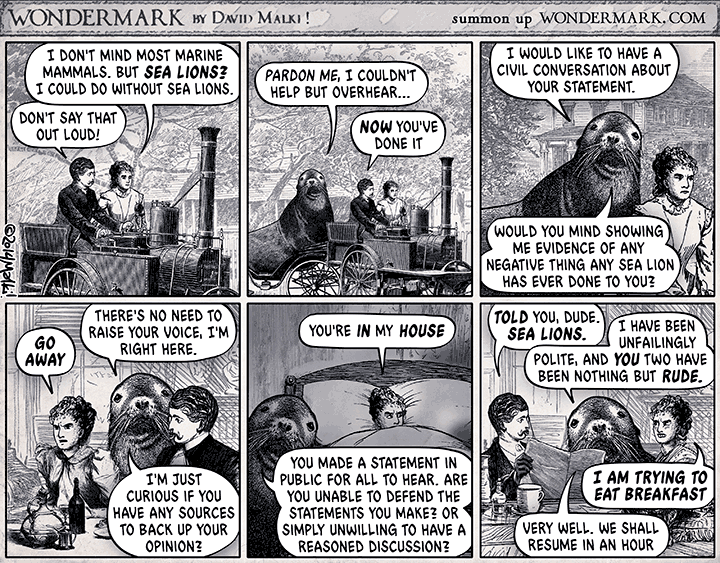The show's good btw...
Capitalist realism. Human society has always been able to solve its problems. The issue is capitalism — our current society — can't solve the problems it created like massive wars, hunger, regular economic crisis, and global warming.
Capitalism hasn't existed forever, and it won't exist in the future. Our civilization will solve the problem of capitalism by seeing to its abolition.
Are you referring to some pre-capitalism economic systems?
Like Feudalism? Greco-Roman slave-based economies? Tribal subsistence economies? Mesopotamian barter-based economies? Ancient Indian caste-based economies?
Seriously, which system are you pointing to that holds answers? I'm not against your position, I just can't imagine what you mean.
Are you referring to some pre-capitalism economic systems?
Yes. The person with the hammer and sickle handle, who moderates Leftypedia, thinks we should retvrn to a caste system. You nailed it. Your question is definitely in good faith.
Wow. I didn't know that. I just, uh, you're telling me now for the first time. I'm actually sad to hear that. I am sad to hear that. Thank you very much.
But... you sarcastically implied the answer to the question "what pre-capitalistic system are you referring to" is communism. I can't get a read on you unless you're just very confused, bro.
The answer to the question is, "None," because it's a stupid question.
It's like if somebody said they hate cars, and we can do without them. Then some stupid asshole said, "I see. Should we return to the horse and buggy? Perhaps the rickshaw? Chariots, perhaps? Maybe a world where kings are carried on a throne upon the shoulders of slaves? Or maybe just piggyback rides? Kindly ignore the existence of trains and bicycles. Thanks!"
I reject the premise of the question, because the question isn't asked in good faith, and is fucking stupid.
As you wish -- and I agree with you -- but you must admit that sarcastically implying the answer is communism isn't conducive to your position.
I don't know where you're getting all that information, because I'm on mobile and I don't see any of that.
We're not looking to return to anything, we're hoping to finally win the fight against greedy psychopaths
Capitalistic Socialism seems the most successful offshoot of Capitalism. Pure Capitalism is killing its social networks, and the fabric of that system’s societies is falling apart.
It was just the statement that "human society has always been able to solve it's problems" followed by a condemnation of capitalism. So I assumed there was some prior system that worked better for solving problems.
I guess they say Mussolini made the trains run on time. And Egypt's slave economy was stable for thousands of years.
It's like I said, I can't see a prior example that is not meaner and uglier than capitalism, or at least as mean and ugly.
Capitalistic Socialism may indeed be a better path for the future. But I didn't think it could be the original poster's intent.
There's no such thing as sealions, the people you call sealions just disagree with you. Some of them are wrong, some of them are right.
if sealions don't exist, then what's this? https://www.youtube.com/watch?v=CoN6ER9fDpw
apparently "egypts slave economy" is largely debunked. they had slaves like every other stone age culture, but their economy (and pyramid building) relied largely on paid labor
And of all the ones there, that one I pulled out of my ass. Thank you.
For the records, saying that capitalism is temporary does not imply OP desires reverting to a previously existing economic system either, so the egypt thing was a non-sequitor anyways
FWIW, book three is basically "a feminized society is incapable of making the hard but necessary choices". I like the series for its concepts, but not its themes or characters. It has a lot of Incel-adjacent stuff going on.
That said, when we're being so half hearted about global warming, it's hard not to be cynical. People want the solutions to keep everything the same, but without carbon output. It's not going to work that way.
We're having a hard time convincing people that they don't need an EV with 600 miles of range if you're just willing to rest for 20 minutes every two to four hours of driving. Which would be a good idea, anyway. That's a relatively minor change compared to the status quo.
The real solution is high speed rail and bikes. How do we get people to go along with that if we can't even go so far as small changes to road trips?
Honestly, I love driving so, so much, and I cannot fathom a road trip where we don't make a pit-stop at least every four hours. In fact, you kind of had to do that back in the 80's, because fuel economy was total shit back then. My little Mazda fuel sipper had a max range of a bit over 400 miles, and if we had to use my parents' van, it was closer to 250-300.
Also I'm old and I need to pee regularly.

Who the fresh fuck needs an EV that goes for a billion miles?
and I cannot fathom a road trip where we don't make a pit-stop at least every four hours
yall must be roadtrip spartans if you can go 4 hours without a pitstop
We're capable, we just have to stop relying on technology, hierarchies, and buck-passing to solve our societal problems for us.
When we rely on technology (in this case I mean "any human-made cosntruct to solve a problem" and not just "machines"), we start falling into the Golden Hammer bias. Think of a societal issue that you care about, no matter how general, look it up, and see some results are just "So-and-so has invented an app to combat [issue]." Then you look into the app and realize that it doesn't do anything to attack the root of the problem, and instead treats some symptoms while fitting into the existing framework that caused the problem in the first place. Incidentally, that's how society has become so full of middlemen.
E.g. insurance: health care becomes expensive enough to break the bank for everyone below a certain threshhold -> someome proposes a system where everyone pays so the people who need it can cash in -> the people who need it pay for this system, those who don't need it don't pay -> the system needs overhead, so it starts charging more and attempting to drive down costs -> the providers artificially increase prices to compensate for the costs being driven down -> more people need insurance. Wash, rinse, repeat.
Tons of ink has been spilled on the problems with hierarchy, but the simplest argument I can give on why it's bad at solving societal issues is: when you put your fate in someone else's hands, you give them the ability to make choices that negatively impact you with no recourse.
Every solution to this problem so far has either been "let's just add another person who sits above the people who sit above us" (which just adds a layer to the original problem) or "let's try to make our relationship more equal without removing their power over us" which cuts down on the benefits of entrusting that power to someone else AND provides none of the benefits of an equal (horizontal) relationship.
Finally, buck-passing is tempting, especially when the problems aren't our fault. But we've become a global society of people looking to point the finger at someone else, and pay another person to do the hard part for us.
Take climate change for example. One of the rallying cries of online activists has been "100 companies are responsible for 71% of GHG emissions." Great! Now what? What good did assigning blame do? What I've been told is that now we should get them to stop. Ok, how? The response i usually get is to elect officials who will enact sanctions for polluting and rewards for cutting down on pollution. And now we're passing the buck, adding a middleman, giving someone else power over us to control our fate, and completely relying on the demonstrably broken technology that is representative government.
What I want to know is what I can personally do today, starting now, to combat the problem. What change to my lifestyle can I make that won't destroy me or my future? I'm not saying we shouldn't support representatives who act in our interests—we absolutely, unequivocally should do that (unless it hampers our ability to enact a better solution)—but I want a solution I can personally participate in, too.
Because, by and large, those solutions get a lot more good done quicker while relying less on "necessary" evils.
What I'm hearing you say is, we can solve our own problems, we just need human nature to be different. Which, well... Good luck.
To conflate the way of the crowd with human nature is a folly at best
Come on. The way humans behave in groups is certainly part of human nature. And when we're talking about solving problems of a society, it is the most relevant part.
Yes, but not all humans behave the same way in groups. That's why cultures are different, it's why the fields of sociology and anthropology exist, and it's why conflating "something a lot of people do" with "human nature" is pessimist bologna.




